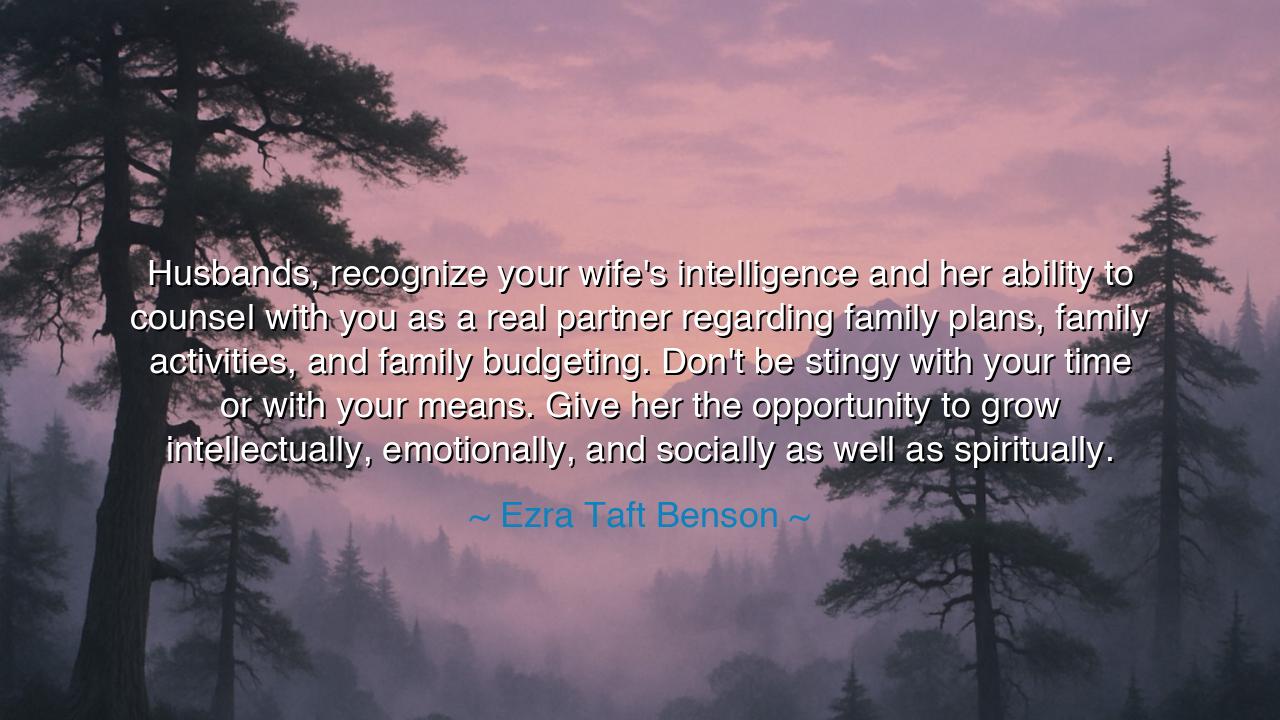
Husbands, recognize your wife's intelligence and her ability to
Husbands, recognize your wife's intelligence and her ability to counsel with you as a real partner regarding family plans, family activities, and family budgeting. Don't be stingy with your time or with your means. Give her the opportunity to grow intellectually, emotionally, and socially as well as spiritually.






In the profound words of Ezra Taft Benson, "Husbands, recognize your wife's intelligence and her ability to counsel with you as a real partner regarding family plans, family activities, and family budgeting. Don't be stingy with your time or with your means. Give her the opportunity to grow intellectually, emotionally, and socially as well as spiritually," we are presented with a vision of partnership that transcends the traditional roles often assigned within marriage. Benson's counsel speaks to the equality and shared responsibility in a partnership, urging husbands to acknowledge the intelligence, wisdom, and capabilities of their wives. It is a call to recognize that the strength of a family lies not in one partner’s dominance but in the mutual respect and collaboration between both individuals.
The ancients understood the importance of partnership in marriage, although it was often shaped by societal norms that restricted women’s voices in matters of governance and decision-making. Yet, figures such as Socrates and Plato did recognize the value of dialogue between men and women. Socrates, through his dialogues, encouraged the importance of discussing ideas and philosophical questions with those who were willing to engage, regardless of gender. In his world, the idea of partnership in intellectual and emotional pursuits was not limited to men alone. In this respect, Benson’s words echo a call for recognition of the full potential of a wife as not merely a caretaker but as an equal partner in all matters—intellectual, emotional, and spiritual.
Consider the example of Cleopatra, the last queen of Egypt, who was a ruler and an intellectual in her own right. Despite the cultural context of her time, Cleopatra’s influence extended far beyond traditional expectations of women. Her ability to engage in complex political and strategic discussions with Julius Caesar and Mark Antony illustrates the power of a woman’s intelligence and her potential to be a true partner, not a mere bystander, in matters of the kingdom. This historical example demonstrates the strength of collaboration between genders, with both individuals contributing their wisdom to the growth and preservation of the family or state. Cleopatra was not just an ornament of her time; she was a partner whose mind and spirit shaped the course of history.
The essence of Benson’s quote lies in the understanding that marriage is not merely a division of labor, but a partnership of shared growth. In the ancient philosophy of Aristotle, the concept of virtue was not an individual pursuit but a communal one, where both partners in a marriage shared the journey of ethical and intellectual development. To recognize one's partner as an intellectual equal, capable of offering sound advice and making important decisions, is to engage in the noble pursuit of a balanced and just life. It is a reminder that growth in marriage comes not from selfishness but from the shared responsibility and mutual respect of two equal partners.
Consider the great partnerships in history where mutual respect and understanding led to remarkable achievements. Marie and Pierre Curie, for example, revolutionized the world of science, particularly with their discovery of radioactivity. It was not a one-sided endeavor; Pierre and Marie were intellectual equals, with Pierre recognizing and nurturing Marie’s genius as much as his own. Their collaboration in their scientific endeavors not only transformed science but showed the world that growth is facilitated when partners empower each other. Marie Curie, in her own right, became the first woman to win a Nobel Prize, and it was a recognition of her abilities, dedication, and vision. This partnership was a model of shared intellectual growth that Benson’s quote advocates—where both partners are given the opportunity to develop fully, intellectually, emotionally, and spiritually.
In our own relationships, whether in marriage or in friendship, the lesson of Benson’s words is clear: a relationship is most fulfilling when it is built upon mutual respect and equality. Just as Socrates advocated for dialogue and exchange of ideas, and Marie and Pierre Curie exemplified mutual support in their scientific work, we too must recognize the value of our partners, not only in domestic duties but in the intellectual and emotional realms as well. It is not enough to merely acknowledge their presence in the family; we must engage them as equals, valuing their thoughts and contributions.
The practical application of this wisdom is simple yet profound: take time to listen to your partner’s opinions on decisions regarding family, budgeting, and even spiritual growth. Offer them the space to grow intellectually and emotionally without constraint, and support them in their own endeavors. In doing so, we do not only build a stronger family, but we also create an environment where both partners can thrive. True partnership is not a static arrangement, but a dynamic and ongoing process of growth, shared responsibility, and mutual respect—values that, when nurtured, will lead to a flourishing union.






AAdministratorAdministrator
Welcome, honored guests. Please leave a comment, we will respond soon